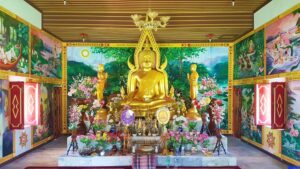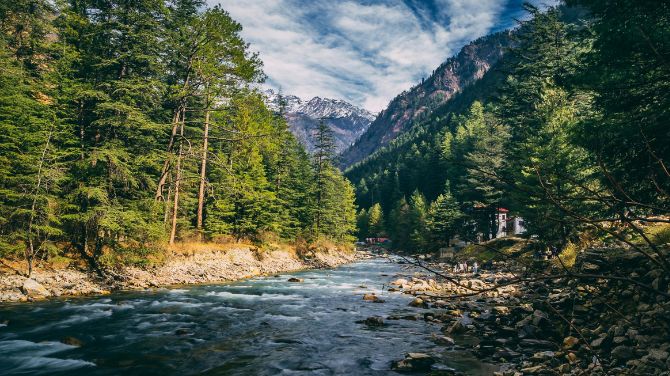India, the birthplace of Buddhism, is not only home to some of the most important Buddhist pilgrimage sites but also hosts vibrant and deeply meaningful festivals celebrated with devotion and grandeur. These Buddhist festivals in India are more than just religious observances; they are celebrations of peace, compassion, community, and cultural heritage. If you are planning your spiritual journey or seeking meaningful cultural experiences, here is why you should attend these vibrant Buddhist festivals in India.
1. Immerse Yourself in Spirituality
The core essence of Buddhist festivals in India lies in spreading the teachings of Lord Buddha – compassion, peace, and mindfulness. Festivals like Buddha Purnima, which celebrates the birth, enlightenment, and Mahaparinirvana of Buddha, offer an opportunity to immerse yourself in spiritual practices. Devotees meditate, chant sutras, and engage in acts of kindness and charity. Attending such festivals at sacred sites like Bodh Gaya and Sarnath will help you connect deeply with the teachings of Buddha and find inner peace.
2. Experience Rich Cultural Traditions
Each Buddhist festival in India is filled with unique cultural traditions, rituals, and performances. For example, Losar, the Tibetan New Year festival celebrated in Ladakh, Sikkim, and Arunachal Pradesh, is a colourful blend of rituals, Cham masked dances by monks, traditional music, and elaborate family feasts. Similarly, the Hemis Festival in Ladakh showcases vibrant Cham dances at the Hemis Monastery, depicting the victory of good over evil. Experiencing these festivals allows you to witness the living cultural heritage of Buddhist communities in India.
3. Witness Traditional Cham Dances
Many Buddhist festivals in India include Cham masked dances performed by monks in monasteries. Festivals such as Hemis, Kagyed Dance Festival in Sikkim, and Phang Lhabsol feature these captivating performances. The monks wear elaborate masks and costumes, and their dance movements depict stories of Buddhist deities, legends, and the triumph of virtue. Watching these performances is a mesmerising experience and a powerful visual representation of Buddhist teachings and art.
4. Celebrate with Local Communities
Attending Buddhist festivals in India allows you to become part of local communities, witness their way of life, and understand their values. During Saga Dawa in Sikkim, for example, devotees circumambulate monasteries and stupas, light butter lamps, and perform charitable acts to accumulate merit. Being part of such celebrations lets you connect with locals, learn about their customs, and feel the sense of harmony and community that these festivals foster.
5. Gain Historical and Cultural Insights
Many Buddhist festivals in India are celebrated at ancient monasteries and heritage sites, giving you an opportunity to learn about Buddhist history and architecture. For instance, attending Buddha Purnima celebrations in Bodh Gaya will let you explore the Mahabodhi Temple Complex, a UNESCO World Heritage Site. Similarly, festivals like Kathina Ceremony, held in Bodh Gaya and other Buddhist centres, provide insights into monastic traditions, community values, and rituals of offering robes and alms to monks.
6. Experience the Festive Atmosphere
The festive atmosphere during Buddhist festivals in India is filled with positivity, devotion, and joy. Whether it is the rhythmic beating of drums during Cham dances, the chanting of sutras in monasteries, or the colourful decorations and prayer flags fluttering in the wind, every moment feels spiritually uplifting. Festivals like Losar create an environment of hope and celebration for the New Year, while Hemis Festival exudes grandeur and devotion.
7. Practice Mindfulness and Compassion
Participating in Buddhist festivals in India offers a perfect opportunity to practice mindfulness, compassion, and generosity – the core values of Buddhism. Festivals like Saga Dawa focus on accumulating merit through good deeds, meditation, and acts of kindness. By engaging in these practices during the festivals, you not only gain spiritual merit but also experience personal growth and mental peace.
8. Explore Unique Regional Variations
Each Buddhist festival in India carries unique regional variations that reflect the cultural diversity of Indian Buddhism. For example, Phang Lhabsol in Sikkim is dedicated to Mount Kanchenjunga, regarded as the protector deity, and features the Pangtoed Cham dance performed by monks to honour the mountain. Similarly, Lhabab Duchen, celebrated in Sikkim and Ladakh, marks Buddha’s descent from Tushita heaven to earth. Experiencing these festivals in their regional settings offers a deeper understanding of cultural diversity.
9. Strengthen Your Spiritual Journey
For spiritual travellers and seekers, attending Buddhist festivals in India is a way to strengthen their spiritual journey. Listening to teachings, participating in rituals, and spending time in monasteries and sacred sites help in gaining clarity, wisdom, and peace. Festivals like Drukpa Tse Shi, which commemorates Buddha’s first sermon, are perfect occasions to reflect on his teachings and their relevance in life.
10. Create Lifelong Memories
Above all, attending these vibrant Buddhist festivals in India will leave you with unforgettable memories of cultural beauty, spiritual energy, and human connection. The serene prayers of Buddha Purnima, the colourful dances of Losar, and the grand celebrations of Hemis will remain etched in your heart forever, inspiring you to live with compassion and gratitude.
Final Thoughts
Whether you seek spiritual growth, cultural exploration, or simply wish to witness India’s rich traditions, attending Buddhist festivals in India is an experience you will cherish for life. These festivals not only connect you with the timeless teachings of Buddha but also let you celebrate the vibrant heritage and peaceful spirit that define Buddhism in India.















Leave a comment